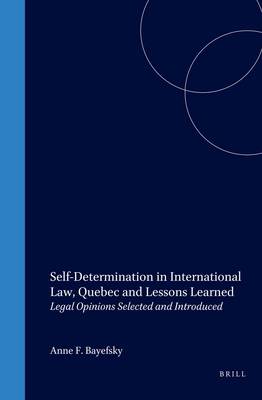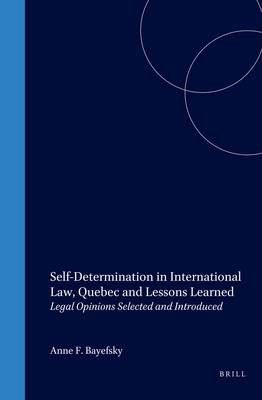
- Afhalen na 1 uur in een winkel met voorraad
- Gratis thuislevering in België vanaf € 30
- Ruim aanbod met 7 miljoen producten
- Afhalen na 1 uur in een winkel met voorraad
- Gratis thuislevering in België vanaf € 30
- Ruim aanbod met 7 miljoen producten
Self-Determination in International Law, Quebec and Lessons Learned
Legal Opinions Selected and Introduced
Anne Bayefsky
Hardcover | Engels
€ 547,95
+ 1095 punten
Omschrijving
The case of Quebec within Canada, and the Supreme Court of Canada's case on the legality of secessionist attempts by Quebec, is one example of the tension associated with the relationship between self-determination and a right of secession. The object of the book is to render available to the international community the expert opinions and legal arguments associated with the Supreme Court of Canada's decision on the Quebec Secession Reference. The questions put to the Court in large part concerned international law, leading the parties to the Reference to seek opinions from international law experts around the world as they prepared their arguments which are presented in this book.
Self-determination is an idea rooted in human dignity and its meaning and force parallel the emergence of new understandings of the nature of sovereignty and the role of international law in the protection of human rights. The UN Human Rights Committee has identified self-determination as one of the most awkward principles to define because abuse of this right could jeopardize international peace and security. Self-determination, as formulated by the International Court of Justice, requires a free and genuine expression of the will of the peoples concerned. But serious questions remain about the extent of the relationship between self-determination and a right of secession. Does self-determination legitimate internal self-government, association of some kind with another state, or statehood, and in what contexts?
Self-determination is an idea rooted in human dignity and its meaning and force parallel the emergence of new understandings of the nature of sovereignty and the role of international law in the protection of human rights. The UN Human Rights Committee has identified self-determination as one of the most awkward principles to define because abuse of this right could jeopardize international peace and security. Self-determination, as formulated by the International Court of Justice, requires a free and genuine expression of the will of the peoples concerned. But serious questions remain about the extent of the relationship between self-determination and a right of secession. Does self-determination legitimate internal self-government, association of some kind with another state, or statehood, and in what contexts?
Specificaties
Betrokkenen
- Auteur(s):
- Uitgeverij:
Inhoud
- Aantal bladzijden:
- 552
- Taal:
- Engels
Eigenschappen
- Productcode (EAN):
- 9789041111548
- Verschijningsdatum:
- 1/03/2000
- Uitvoering:
- Hardcover
- Formaat:
- Genaaid
- Afmetingen:
- 155 mm x 235 mm
- Gewicht:
- 933 g

Alleen bij Standaard Boekhandel
+ 1095 punten op je klantenkaart van Standaard Boekhandel
Beoordelingen
We publiceren alleen reviews die voldoen aan de voorwaarden voor reviews. Bekijk onze voorwaarden voor reviews.










